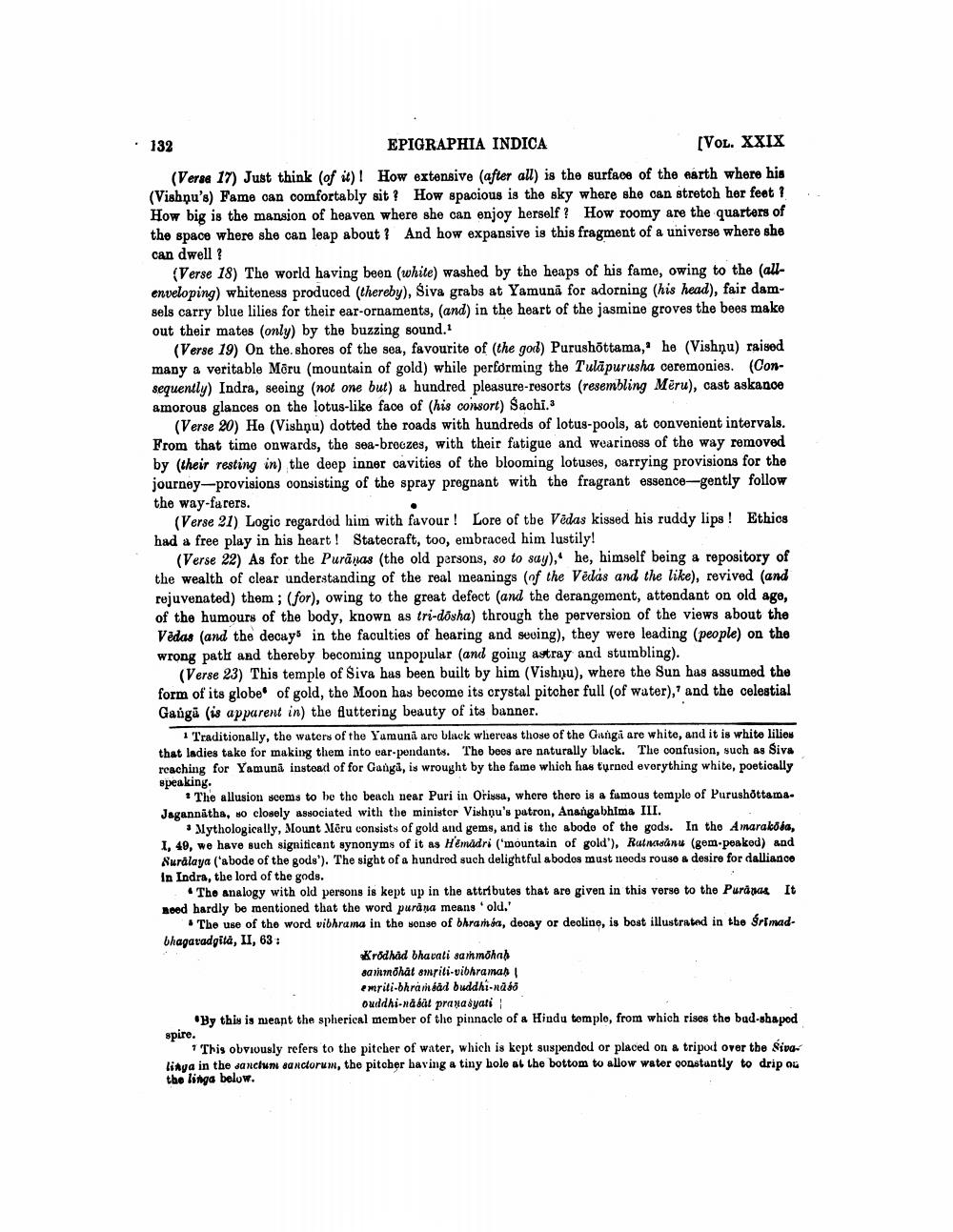________________
• 132 EPIGRAPHIA INDICA
[Vol. XXIX (Verse 17) Just think (of it)! How extensive (after all) is the surface of the earth where his (Vishnu's) Fame can comfortably sit? How spacious is the sky where she can stretoh her feet! How big is the mansion of heaven where she can enjoy herself? How roomy are the quarters of the space where she can leap about? And how expansive is this fragment of a universe where she can dwell?
(Verse 18) The world having been (white) washed by the heaps of his fame, owing to the (allenveloping) whiteness produced (thereby), Siva grabs at Yamuna for adorning (his head), fair damsels carry blue lilies for their ear-ornaments, (and) in the heart of the jasmine groves the bees make out their mates (only) by the buzzing sound.
(Verse 19) On the shores of the sea, favourite of the god) Purushottama," he (Vishņu) raised many a veritable Mēru (mountain of gold) while performing the Tulāpurusha ceremonies. (Consequently) Indra, seeing (not one but) a hundred pleasure-resorts (resembling Mēru), cast askanoe amorous glances on the lotus-like face of his consort) Sachi.
(Verse 20) He (Vishnu) dotted the roads with hundreds of lotus-pools, at convenient intervals. From that time onwards, the sea-broozes, with their fatigue and weariness of the way removed by (their resting in the deep inner cavities of the blooming lotusos, carrying provisions for the journey-provisions consisting of the spray pregnant with the fragrant essence-gently follow the way-farers.
(Verse 21) Logic regarded him with favour ! Lore of the Vēdas kissed his ruddy lips ! Ethics had a free play in his heart! Statecraft, too, embraced him lustily!
(Verse 22) As for the Purānas (the old persons, so to say), he, himself being a repository of the wealth of clear understanding of the real meanings of the Vedas and the like), revived (and rejuvenated) them ; (for), owing to the great defect (and the derangement, attondant on old age, of the humours of the body, known as tri-dôsha) through the perversion of the views about the Vēdas (and the decays in the faculties of hearing and seeing), they were leading (people) on the wrong path and thereby becoming unpopular (and going astray and stumbling).
(Verse 23) This temple of Siva has been built by him (Vishnu), where the Sun has assumed the form of its globe of gold, the Moon has become its crystal pitcher full (of water)," and the celestial Ganga (is apparent in) the futtering beauty of its banner.
1 Traditionally, the waters of the Yamuni aro black whereas those of the Gangi are white, and it is white lilios that ladies take for making them into ear-pendants. The bees are naturally black. The confusion, such as Siva reaching for Yamuna instood of for Gangi, is wrought by the fame which has turned everything whito, poetically speaking.
The allusion seems to be the beach near Puri in Orissa, where there is a famous temple of Purushottama. Jagannatha, so closely associated with the minister Vishnu's patron, Anangabhima III.
Mythologically, Mount Meru consists of gold and gems, and is the abodo of the gods. In the Ararakowa, 1, 49, we have such significant synonyms of it as Hēmádri (mountain of gold'), Rutncnu (gem.peaked) and Suralaya ('abode of the gods'). The sight of a hundred such delightful abodos must needs touse a desire for dalliance in Indra, the lord of the gods.
The analogy with old persons is kept up in the attributes that are given in this verse to the Purant It need hardly be mentioned that the word purana means old.'
The use of the word vibhrama in the wonse of bhramsa, decay or decline, is best illustrated in the Grimadbhagavadgita, II, 63:
Krodhad bhavali sam mohah sarundhat sapiti-vibhramah emriti-bhramsad buddhi-náso
ouddhi-nábāt praxašyati By this is meant the spherical member of the pinnacle of a Hindu templo, from which rises the bad-shapod spire.
* This obviously refers to the pitcher of water, which is kept suspended or placed on a tripod over the Šiva. linya in the sanctum sanctorum, the pitcher having a tiny hole at the bottom to allow water constantly to drip og the linga below.




